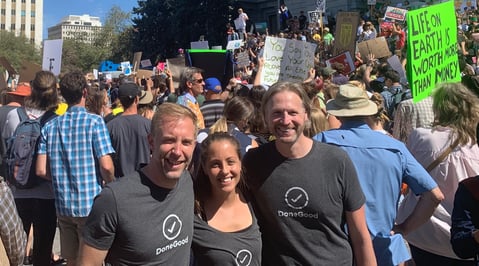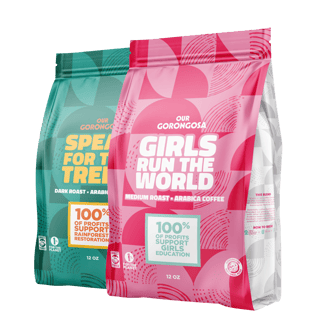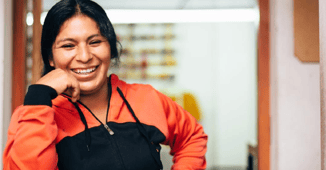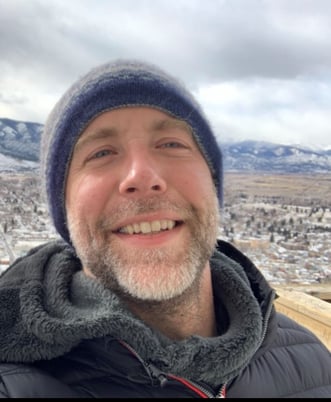Practical Activist Q&A featuring Cullen Schwarz, DoneGood
- Bluestone Staff
- January 20, 2022
Feature photo: Cullen Schwarz in action on a Denver Start-Up panel.
Cullen Schwarz is the Chief of Good Thoughts (aka CEO) of DoneGood, dubbed as “the Amazon of social good” by Forbes. DoneGood makes it quick, easy and affordable to use our purchasing power for good and connects people to over 200 socially responsible brands via their marketplace shopping site. DoneGood is a fellow member of 1% for the Planet and a Public Benefit Corporation.
Highlights from our conversation with Cullen
"Conscious consumerism is exploding exponentially around the world. People are realizing that who we choose to give our money to is probably the biggest impact we all make on the world."
"We don’t want to fill the world with more stuff. We don’t want people to buy things that they don’t need. But, when you do need to buy, cast a vote with your dollars. If every time we make a purchase we’re voting with our wallets, then never buying anything is like sitting out the election. To get the systemic change we need in our economy, businesses that are operating ethically and sustainably must succeed."
"When people are buying items that are made by workers who are paid a living wage and with business practices that fight climate change, the market will supply more living wage jobs and will supply business practices that fight climate change. It’s happening, and now we just need that change to go more quickly. Consumer demand is the force that will drive that change going forward."
Our Full Q&A with Cullen
Q: You launched DoneGood in 2015, what do you think is the most transformative thing that you’ve learned in your journey so far?
A: I’ve learned just how much people want to find ways to make change happen. People are hungry and are looking for all sorts of things that they can do as individuals to make the world better and to live their values. So making change isn’t about “making people care.” There’s care in large supply. The challenge is to make it easier for people to act, and that’s our mission at DoneGood.
Q: What are the trends or shifts that you’re seeing in your business and the DoneGood community in the last five years?
A: Conscious consumerism is exploding exponentially around the world. People are realizing that who we choose to give our money to is probably the biggest impact we all make on the world. You can see the growth in the market for sustainable goods. The market for sustainable goods in the U.S. alone last year was $114 billion, and fifty percent of the growth in all Consumer Packaged Goods (CPG) was driven by demand for sustainable goods!
Photo below: Cullen and team mates at a Climate Justice Rally.
 In a supply and demand economy, consumers have all the power: whatever we demand, the market supplies. So, when people are buying items that are made by workers who are paid a living wage and with business practices that fight climate change, the market will supply more living wage jobs and will supply business practices that fight climate change. It’s happening, and now we just need that change to go more quickly. Consumer demand is the force that will drive that change going forward.
In a supply and demand economy, consumers have all the power: whatever we demand, the market supplies. So, when people are buying items that are made by workers who are paid a living wage and with business practices that fight climate change, the market will supply more living wage jobs and will supply business practices that fight climate change. It’s happening, and now we just need that change to go more quickly. Consumer demand is the force that will drive that change going forward.
Impact investing is becoming more mainstream, and companies are also seeing that people want to work where they are doing something for the greater good. So, whether a business is trying to attract more customers, investment or talent, they increasingly must have a purpose beyond just extracting maximum profit.
I think that will be the most important change of our time—the shift from the old 20th century Milton Friedman philosophy that says: “The sole purpose of business is to extract maximum profit at all costs,” and instead to a paradigm that says we expect businesses to be moral actors in the world, just like we expect people to be. Companies that don’t understand this will be left behind.
Q: What are the criteria that you look at when you’re choosing brands that are “socially responsible?”
A: At the highest level, we look for brands that do good for people and the planet. Good for people means paying a living wages, being free of child and trafficked labor, and having safe working conditions. In the U.S., we use MIT’s living wage calculator which sets out living wages by county to see if the companies are paying workers a living wage. When we’re looking at production facilities in other countries we look to other nonprofit partners to help us make that determination.
 On “good for the planet,” we’re looking for companies that are substantially more sustainable than their big-name counterparts in their industries. It’s always a bit subjective because we come across companies that are ecofriendly in such a broad variety of ways. For example, one may be manufacturing in a large facility powered by clean energy, sourcing ecofriendly materials and non-toxic dies, and then there might be a small company that’s two women working in a garage making cool dog collars out of upcycled cowboy boots. So all brands are very sustainable, though some in very different ways from each other.
On “good for the planet,” we’re looking for companies that are substantially more sustainable than their big-name counterparts in their industries. It’s always a bit subjective because we come across companies that are ecofriendly in such a broad variety of ways. For example, one may be manufacturing in a large facility powered by clean energy, sourcing ecofriendly materials and non-toxic dies, and then there might be a small company that’s two women working in a garage making cool dog collars out of upcycled cowboy boots. So all brands are very sustainable, though some in very different ways from each other.
To determine if a brand meets our criteria, we use a combination of aggregating data from third party certification organizations, doing our own research, conducting interviews with the people at each company, then having them provide supporting documentation for any of the claims they’re making. At the end of the process, they sign an affidavit.
 We thought about having impact “scores,” for overall impact and/or scores for specific categories, but we realized that having too many numbers can make your head swirl with data while you’re trying to shop. And, who gets the best environmental score, the big company that’s producing in the incredibly sustainable factory, or the two women in the garage who have a tiny carbon footprint and are taking waste out of the waste stream by making upcycled products? It’s hard to give one a better score than the other. So, we decided to tell the stories of what the brands are doing to be good for people and the planet, and then let the people decide where they want to shop.
We thought about having impact “scores,” for overall impact and/or scores for specific categories, but we realized that having too many numbers can make your head swirl with data while you’re trying to shop. And, who gets the best environmental score, the big company that’s producing in the incredibly sustainable factory, or the two women in the garage who have a tiny carbon footprint and are taking waste out of the waste stream by making upcycled products? It’s hard to give one a better score than the other. So, we decided to tell the stories of what the brands are doing to be good for people and the planet, and then let the people decide where they want to shop.
Q: How does DoneGood support nonprofits that are working for positive social and environmental impact?
A: We’re 1% for the Planet members so a portion of our revenue goes to environmental nonprofits. We also offset the carbon emissions of every order that’s shipped so all shipping is net zero emissions. That means that it’s lower emissions to buy from DoneGood than it is to drive to a store and pick something up—since driving a car is a huge carbon emitter, and the product had to get shipped to the store and that emissions from that shipping is likely not offset.
We also engage in special programs that respond to current needs. For example, after the devastating earthquake in Haiti last year, we worked with four partner brands whose production was based in Haiti to give all of revenue from purchases from those brands on a particular day to relief programs in Haiti. Our alternative to Black Friday is Shop for Good Sunday and on that day, for every order placed we purchased a tree in the Congolese Rainforest to protect from clear cutting. We like to protect trees because it’s protecting existing forests today which has immediate impact versus planting trees which takes time to realize the gains.
Many of our partner brands have programs where they donate to nonprofits as well, so often you’re making a double-whammy of impact when you make a purchase on DoneGood.
Q: When you look at your background in government, what has prepared you the most for the work you’re doing at DoneGood?
A: I got into government because I wanted to make a difference and fight for positive change through public policy. But I found the pace of change in D.C. to be kind of slow. So, I looked around and asked: what could really have the biggest positive impact on the world? And I think it is unleashing the power of consumer spending to get businesses to operate in a way that is better for people and planet. Americans gave $450 billion to charity last year, but we spent over 300 times more than that buying stuff. So, if even a fraction of what we spend can reduce poverty and fight climate change, that can have a huge impact.
The other similarity between my background and what I’m doing now is that I’m still trying to help people turn their beliefs into action. In government, the action you want people to take is to vote. With DoneGood, it’s giving people the opportunity to vote with their wallets.
Q: Do you have any advice for people who feel overwhelmed when they think about systems change?
A: I understand the feeling and I feel that way too sometimes. Conscious consumers are thoughtful people by definition and they’re thinking about the impact of all of their decisions. From where they work to compositing and recycling, when we analyze every decision, it is exhausting. So, I think it’s about making the choices to do what we can that have a net positive effect. When it’s time to look for another job, look at the impact employers have on people and planet. When it’s time to make a purchase, think about that decision. It’s accepting that you’re not going to do everything today all at once. It’s also important to be optimistic and make sure you’re not filtering out the positive information. We tend to be presented with the bad news, but there is no question we have made progress on issues like the fight against climate change over the past few decades; people are more conscious and doing more about the problem now than ever. We need the pace of that change to accelerate, but there’s just no doubt we’re moving in the right direction. So, we need to try to recognize the good along with the bad. Feel empowered by the choices you do make. If the majority of the choices you make are aligned with values you believe in, you’re doing all right.
Q: Often when people think of Amazon, they think of “overconsumption.” How do you think about the impact of consumption in the DoneGood business model?
A: I think about this all the time. We don’t want to fill the world with more stuff. We don’t want people to buy things that they don’t need. But, when you do need to buy, cast a vote with your dollars. If every time we make a purchase we’re voting with our wallets, then never buying anything is like sitting out the election. To get the systemic change we need in our economy, businesses that are operating ethically and sustainably must succeed. For them to succeed, those of us who care about these issues need to support them. When we support businesses that do good for people and the planet, they’re more successful and it encourages other businesses to follow suit because they can see the growing consumer demand for fair trade, ecofriendly products.
Photo below: DoneGood features sustainably-made clothing for men and women.
.jpg?width=582&name=women%20laughing%20y%26b%20shirts%20(1).jpg)
Also, the companies that are on DoneGood tend to have higher quality products, and higher quality lasts longer and means you need to buy less in the long run. So, we hope that actually helps reduce overall consumption over time as well.
Q: What are you reflecting on as you kick off 2022?
A: Every year has been better than last at DoneGood. Of course, we want to continue to help more people know about us so that in turn we can help make it easier for more people to make more conscious purchasing decisions., That said, we want to do a better job at making long-term decisions and laying the groundwork for future success and fulfilling our mission. It gets tough—in trying to succeed and expand our mission because we want to make sure that we’re not responding to pressure to see short-term improvement in “the numbers” at the expense of doing the things that really lay the groundwork for doing the best job we can to truly help people who want to shop with us. We also want to make a real emotional connection with our community and help our partner brands be as successful as possible over the long term.
We want to not only focus on ESG (Environmental Social and Governance) metrics, but also adhere to the principles of conscious capitalism and make sure that we’re always living and breathing those principles. Those are things like: is our product truly “a gift to the world,” how do we truly make our customers' lives better, easier and help them feel more empowered? How are we truly helping our partner brands be more successful? When you’re truly doing good, the numbers take care of themselves.
Q: Do you have a mantra or quote that you live by or that inspires you?
 A: One that has stayed with me for a long time is: “The world’s not fair, but a person can be.” I developed that thinking as a kid when adults would give me the old line about how “the world isn’t fair,” ha ha. Another favorite is from Simone de Beauvoir where she says that questioning the meaning of life is absurd, because it’s an attempt to justify existence from beyond existence. We’re all already here. So, the question isn’t, “What is the meaning of life?” The question is: Do you want to keep living and if so, under what circumstances? If you answer that question, then you have a path forward.
A: One that has stayed with me for a long time is: “The world’s not fair, but a person can be.” I developed that thinking as a kid when adults would give me the old line about how “the world isn’t fair,” ha ha. Another favorite is from Simone de Beauvoir where she says that questioning the meaning of life is absurd, because it’s an attempt to justify existence from beyond existence. We’re all already here. So, the question isn’t, “What is the meaning of life?” The question is: Do you want to keep living and if so, under what circumstances? If you answer that question, then you have a path forward.
Photo right: Cullen hiking S Mountain in Salida, Colorado.
Q: Any final thoughts?
A: The cheaper product is not always the best value in the long term. Think about buying less and buying better. We want to make high quality products more affordable and accessible while making products that are better for people and planet. That’s behind everything we do: making it easier and more affordable for people to unleash the world’s most powerful force for change—the dollars we all spend.
Like DoneGood, Bluestone Life is a Certified B Corp and a member of 1% for the Planet. A life insurance policy from Bluestone Life benefits nonprofits within the 1% for the Planet network. We encourage the Practical Activist in vote with our wallets everyday. Learn more about companies who are doing business as a force for good.
Like hearing about Practical Activists?
We’ll share their stories with you monthly. (No email overload… we promise!)


